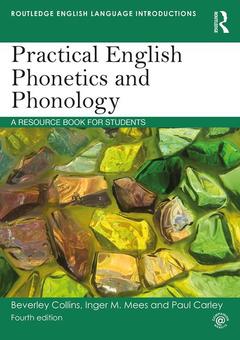Practical English Phonetics and Phonology (4th Ed.) A Resource Book for Students Routledge English Language Introductions Series
Auteurs : Collins Beverley, Mees Inger M., Carley Paul

Routledge English Language Introductions cover core areas of language study and are one-stop resources for students.
Assuming no prior knowledge, books in the series offer an accessible overview of the subject, with activities, study questions, sample analyses, commentaries and key readings ? all in the same volume. The innovative and flexible ?two-dimensional? structure is built around four sections ? Introduction, Development, Exploration and Extension ? which offer self-contained stages for study.
Revised and updated throughout, this fourth edition of Practical English Phonetics and Phonology:
- presents the essentials of the subject and their day-to-day applications in an engaging and accessible manner;
- covers all the core concepts of phonetics and phonology, such as the phoneme, syllable structure, production of speech, vowel and consonant possibilities, glottal settings, stress, rhythm, intonation and the surprises of connected speech;
- incorporates classic readings from key names in the discipline;
- outlines the sound systems of six key languages from around the world (Spanish, French, Italian, German, Polish and Japanese);
- is accompanied by a brand-new companion website which hosts a collection of samples provided by genuine speakers of 25 accent varieties from Britain, Ireland, the USA, Canada, Australia, New Zealand, South Africa, India, Singapore and West Africa, as well as transcriptions, further study questions, answer keys, links to further reading and numerous recordings to accompany activities in the book.
This edition has been completely reorganised and new features include: updated descriptions of the sounds of modern English and the adoption of the term General British (GB); considerable expansion of the treatment of intonation, including new recordings; and two new readings by David Crystal and John Wells.
Written by authors who are experienced teachers and researchers, this best-selling textbook will appeal to all students of English language and linguistics and those training for a certificate in TEFL.
List of figures
List of tables
Audio recordings (on companion website)
Prefaces and acknowledgements
Phonetic symbols
English phonemic transcription key
A Introduction
1 English worldwide
2 Phoneme, allophone and syllable
3 Connected speech and phonemic transcription
4 How we produce speech
5 Consonant possibilities
6 English consonants
7 Vowel possibilities
8 English vowels
9 English spelling
B Development
1 Phoneme and syllable revisited
2 Features of connected speech
3 Stress and rhythm
4 Speech melody
5 Pronunciation change
6 Teaching a foreign language
7 Learning a foreign language
C Exploration
1 Accent variation: General American
2 Accents of the British Isles 1: England
3 Accents of the British Isles 2: Celtic-influenced varieties
4 World accent varieties 1: North America
5 World accent varieties 2: the Southern Hemisphere
6 World accent varieties 3: second-language varieties and creole-influenced speech
D Extension
1 Attitudes to accents (Daniel Jones)
2 Preliminaries to teaching pronunciation (Peter Avery and Susan Ehrlich)
3 English accents and their implications for spelling reform (J. C. Wells)
4 Teaching the pronunciation of English (David Crystal)
5 Syllabification and allophony (J. C. Wells)
Glossary
Further reading
References
Index
The International Phonetic Alphabet 307
Beverley Collins (1938–2014) held lectureships in phonetics at the universities of Lancaster and Leiden, and was Visiting Professor at Ghent University. He was also a regular lecturer at the UCL Summer Course in English Phonetics.
Inger M. Mees is Associate Professor in the Department of Management, Society and Communication at the Copenhagen Business School. She has also held posts at the universities of Leiden and Copenhagen. She is on the academic staff of the UCL Summer Course in English Phonetics.
Paul Carley has held posts at the University of Applied Sciences Utrecht and the universities of Bedfordshire and Leicester. He is a regular lecturer on the UCL Summer Course in English Phonetics.
Date de parution : 05-2019
17.4x24.6 cm
Disponible chez l'éditeur (délai d'approvisionnement : 14 jours).
Prix indicatif 45,15 €
Ajouter au panierDate de parution : 05-2019
17.4x24.6 cm
Disponible chez l'éditeur (délai d'approvisionnement : 14 jours).
Prix indicatif 160,25 €
Ajouter au panierThèmes de Practical English Phonetics and Phonology :
Mots-clés :
Practical phonetics and phonology; phonetics and phonology; Inger Mees; Beverley Collins; Routledge English Language Introductions; Routledge phonetics; phonetics textbook; phonetics introduction; phonology introduction; Scots Gaelic; Hard Palate; Vocal Folds; Vice Versa; Longman Pronunciation Dictionary; Steady State Vowels; Teaching Pronunciation; Fortis Consonants; Bath Words; Fortis Plosives; Strut Vowel; Main Verb; Goose Vowel; Alveolar Ridge; Traditional RP; Connected Speech; Southern USA; Multicultural London English; Phonemic Transcription; Lenis Consonants; Syllabic Consonants; Sentence Stress; Pre-fortis Clipping; Cardinal Vowels; Low Fall



